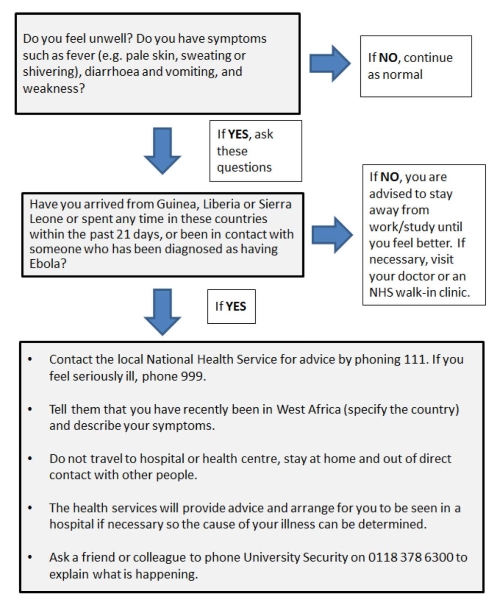Ebola: information, advice and support
Ebola: information, advice and support
The World Health Organisation (WHO) has declared that the Ebola Virus Disease outbreak occurring in West Africa is an 'international emergency'. The Ebola outbreak primarily involves three countries where there is widespread and intense transmission: Guinea, Liberia, Sierra Leone. In addition the WHO reports that there are five countries with a small number of cases and limited localised transmission (Nigeria, Senegal, Spain, the United States of America and the Democratic Republic of the Congo).
The risk to the UK remains very low.
Ebola: information and guidance
Ebola is a rare but serious viral infection. Transmission of Ebola from person to person is by direct contact with blood and body fluids from an infected person. People who have the Ebola virus do not become infectious until they have developed symptoms, such as a fever. The incubation period, the time between infection and symptoms appearing, ranges from two to 21 days.
The spread of the virus is not airborne and it is not spread through routine social contact (such as shaking hands) with people who do not have symptoms.
So far, there has been just one imported case of Ebola in the UK and no case of transmission to any other person. The UK government is closely monitoring the spread of the Ebola virus in Sierra Leone, Liberia and Guinea. For people living outside Africa there is a very low threat and experts believe even if the virus did arrive in the UK it would be very unlikely to spread.
The University is following the latest official health advice from Public Health England, NHS Choices and Universities UK. If there is any change to the current advice, the University web site will be updated.
Travel advice - going to West Africa
The UK Government (Foreign Office) is currently advising against all non-essential travel to Liberia, Sierra Leone and Guinea and that travel into and from some of these countries is now limited.
All staff and students who travel on University business or in connection with research or study must follow the approval procedures set out in Safety Code of Practice 38 for overseas travel. In view of the current UK Government advice about non-essential travel to the three affected countries, the University has decided that permission to travel to these three countries will not be possible for the foreseeable future.
For travel to other countries in West Africa, staff and students travelling on University business must follow UK Government advice and Safety Code of Practice 38. You are advised to contact the following members of staff for advice on travel precautions:
Staff: Head of Health and Safety Services, Moira Simpson, email m.e.simpson@reading.ac.uk
Students: Student Communication Officer, Richard Sandford, r.j.sandford@reading.ac.uk
Staff and students from the affected countries may wish to return home, for example to visit family. If you need advice, or are experiencing problems with travel, contact or other arrangements, you should contact Student Services (for students) or Health and Safety Services (for staff) for advice and support. Anyone who decides to travel to the affected countries for personal reasons must follow the travel advice issued by the UK Government to minimise the risk of infection while in country.
Travel advice - coming to the UK from West Africa
Travel restrictions and exit screening at airports are in place in Sierra Leone, Guinea and Liberia. The UK Government has introduced enhanced screening for Ebola at Heathrow and Gatwick airports and St Pancras (Eurostar), for passengers who have travelled from Sierra Leone, Guinea and Liberia.
Students and staff arriving back in the UK having travelled from any of the affected countries who are free of symptoms are not infectious, and should have no restrictions on their education or normal activities.
If symptoms subsequently develop, follow the flow chart below to decide if urgent medical assessment is required.
Remember that unless a traveller has come into contact with an infected person, there is very little chance of being affected. There are many other illnesses with similar symptoms - such as malaria - which are much more common in returning travellers. Normal good hygiene practice such as handwashing with soap and water can destroy the Ebola virus and will also offer protection against much more common infections such as flu.
Specific advice for staff outlining what to do if a student becomes ill following their return from an affected country is available from the Public Health England website.
Coordinating information and advice
It is important that reliable information is gathered from across the University so that up-to-date advice can be given to staff and students. If, after travelling to West Africa, you feel unwell with fever/sickness and have to contact the health services e.g. by phoning 111, to get advice about your symptoms, please also inform University Security on 0118 378 6300 or ask a friend or colleague to do so on your behalf.
If you are unwell with fever or sickness - what to do
(Click the image below to download the Ebola flowchart).

Ebola: Who to contact
If you have travelled from Guinea, Liberia or Sierra Leone within the last 21 days, and now feel unwell with fever, chills, muscle aches, nausea, vomiting, diarrhea, sore throat or rash, contact the local health services by phoning 111.
Explain that you have recently been to West Africa.
Stay out of direct contact with other people while waiting for advice from the health services.
Please also inform University Security on 0118 378 6300 or ask a friend or colleague to do so on your behalf.
